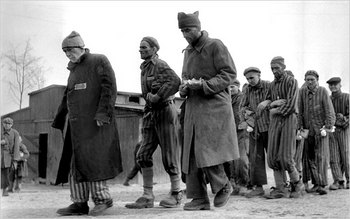
Survivors of Buchenwald at the time the Allies arrived in April 1945. (Eric Schwab/Agence France-Presse — Getty Images)
THE SEVENTH WELL
By Fred Wander.
Translated by Michael Hofmann.
160 pp. W. W. Norton & Company. $23.95.
By JASCHA HOFFMAN
At the end of Fred Wander’s novel about life in the Nazi camps, the narrator lies in the children’s barracks of Buchenwald between a dead man and a pack of starving Jewish boys. It is April 1945; American tanks are at the gate. Delirious from typhus, he is overcome by hope as he watches the boys slice up a potato. “Some might say the camp and its bestial conditions had destroyed their human substance,” he writes, but “I knew right then: everything will start over, nothing has been lost.”
In light of all Fred Wander did lose to the Nazis — his mother, his sister, most of his 20s — this may seem a strangely optimistic statement. Born to Jewish Galician parents in Vienna in 1917, he was deported as a young man to a series of French work camps and survived the death march from Auschwitz to Buchenwald. After the war he eventually settled in East Germany, where he made a new life as a reporter and photographer. It was only in the late 1960s, after his 10-year-old daughter died in an accident, that he began to revisit his past.
The result was “The Seventh Well,” a novel narrated by a young man who attempts to maintain his own sanity in the death camps by immersing himself in the lives of his fellow prisoners. Originally published in 1971, it is now available in a superb new translation by Michael Hofmann. Wander does not guide the reader on his own journey from boxcar to barbed wire, as Elie Wiesel and Primo Levi have done. Rather, his anonymous narrator undergoes a sort of spiritual education as he studies the doomed men and boys around him. The result is an indirect portrait of a man trying to grasp an unthinkable trauma.
“A man lugs rocks, lugs wood, cracks lice, fights over a potato ... learns to blow his nose downwind with one finger, wraps his sore feet in rags,” Wander’s narrator writes. “What keeps a man alive?” For him the answer is affection for others, memories of home, language itself and some dim hope of survival. These signs of spirit can vanish without warning. To survive in the camps one must adapt, but there is a fine line between adapting and surrendering. After his lover is hauled off from a French camp to Auschwitz, for example, a formerly rebellious young man gives himself up without a fight.
Wander’s narrator observes his surroundings, from the eating habits of his fellow prisoners to the shifting colors of the sky, with an attention that verges on defiance. When an exhausted man steps out of the march to Buchenwald to defecate, he is shot in the head. This happens repeatedly, but the narrator takes in each murder with fresh shock, as if by the strength of his gaze alone he can rescue these strangers from the ditch.
The sense that anyone can be saved, however, begins to crumble when he loses his bunkmate Tadeusz Moll, a teenager rumored to have been saved from the gas chamber by a guardian angel. As punishment for an unauthorized nap, Tadeusz is put out in the forest overnight to freeze and is later publicly hanged. Lying in bed, the narrator imagines the boy’s last moments: “Perhaps life, compressed into that tiny remaining time, sharpened by barely imaginable sufferings, perhaps life has become distilled into some quintessence of itself.” But he reconsiders. “No. ... Let’s take it at face value: dying means dying.”
Veering between the sentimental and the brutal, Wander tries to make sense of his own random survival. Sometimes his memory of the camps seems too generous: Did Buchenwald really simmer with “curiosity, wonderment, thirst for knowledge”? Was there really “earnestness and dignity and purpose” in the faces of the dead? But most of the incidents Wander describes — for instance, that “one of us choked to death from a hemorrhage incurred from laughing” — have a pure horror that can’t be varnished.
Throughout the novel runs the voice of Wander’s own Virgil, Mendel Teichmann, the gaunt and charismatic 50-year-old who teaches him to tell stories in the barracks after dark. At first Teichmann devours his ration of bread, but as his strength ebbs he learns, like the others, to make a crust of bread into a seven-course meal. Teichmann, an agnostic, tries to make sense of the Holocaust by comparing it to the water of the seventh well described by the 16th-century Rabbi Loew of Prague, which leaves Jews naked and pure.
It may be hard to believe that a man could keep that much dignity while he is preoccupied, as the narrator puts it, with his own “piecemeal execution.” In the end Wander does not ask us to: when Teichmann dies there is no attempt to redeem his suffering. Wander writes, “He died a senseless and undignified death, let me pass over it in silence.”
Jascha Hoffman is on the editorial staff of The New York Review of Books.